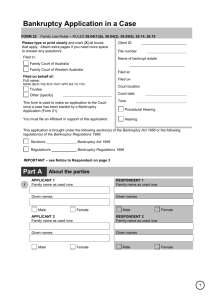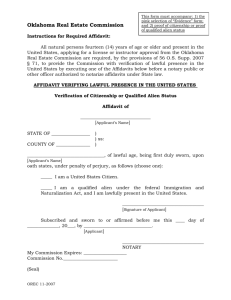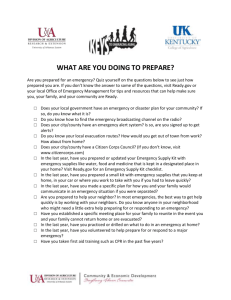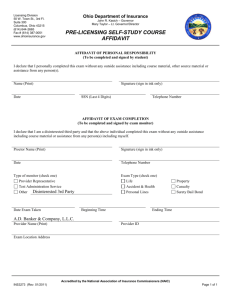Financial Contravention Proceedings Kit - Family Court WA
advertisement
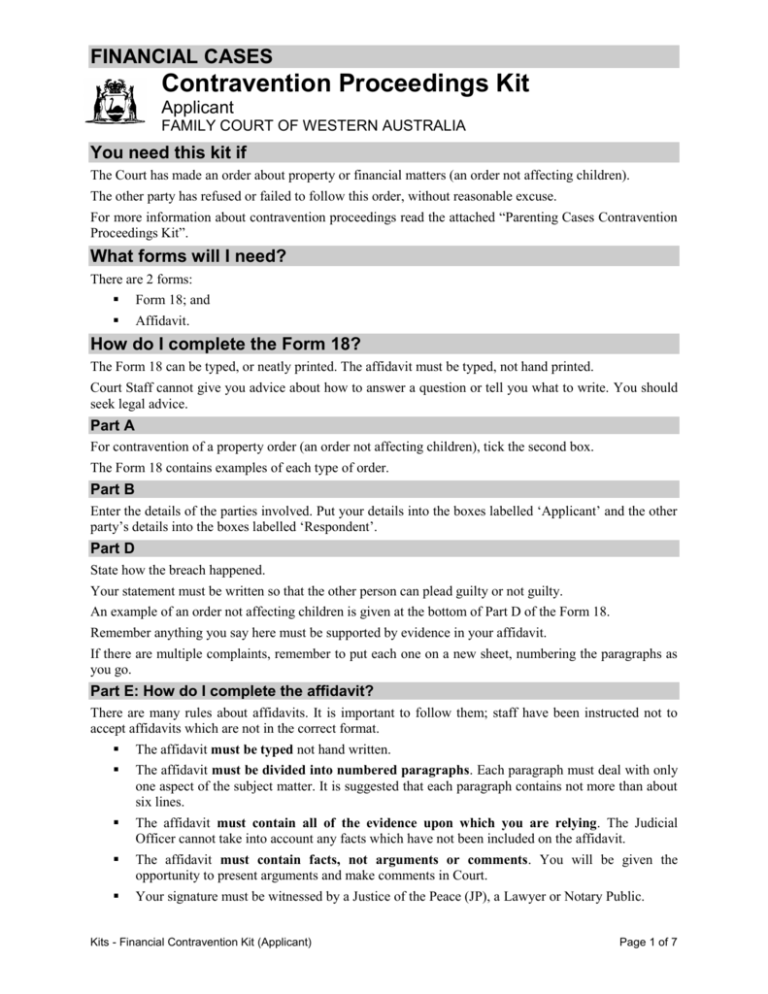
FINANCIAL CASES Contravention Proceedings Kit Applicant FAMILY COURT OF WESTERN AUSTRALIA You need this kit if The Court has made an order about property or financial matters (an order not affecting children). The other party has refused or failed to follow this order, without reasonable excuse. For more information about contravention proceedings read the attached “Parenting Cases Contravention Proceedings Kit”. What forms will I need? There are 2 forms: Form 18; and Affidavit. How do I complete the Form 18? The Form 18 can be typed, or neatly printed. The affidavit must be typed, not hand printed. Court Staff cannot give you advice about how to answer a question or tell you what to write. You should seek legal advice. Part A For contravention of a property order (an order not affecting children), tick the second box. The Form 18 contains examples of each type of order. Part B Enter the details of the parties involved. Put your details into the boxes labelled ‘Applicant’ and the other party’s details into the boxes labelled ‘Respondent’. Part D State how the breach happened. Your statement must be written so that the other person can plead guilty or not guilty. An example of an order not affecting children is given at the bottom of Part D of the Form 18. Remember anything you say here must be supported by evidence in your affidavit. If there are multiple complaints, remember to put each one on a new sheet, numbering the paragraphs as you go. Part E: How do I complete the affidavit? There are many rules about affidavits. It is important to follow them; staff have been instructed not to accept affidavits which are not in the correct format. The affidavit must be typed not hand written. The affidavit must be divided into numbered paragraphs. Each paragraph must deal with only one aspect of the subject matter. It is suggested that each paragraph contains not more than about six lines. The affidavit must contain all of the evidence upon which you are relying. The Judicial Officer cannot take into account any facts which have not been included on the affidavit. The affidavit must contain facts, not arguments or comments. You will be given the opportunity to present arguments and make comments in Court. Your signature must be witnessed by a Justice of the Peace (JP), a Lawyer or Notary Public. Kits - Financial Contravention Kit (Applicant) Page 1 of 7 Where do I find a Justice of the Peace? There is usually a JP at the Family Court of WA between 9:30am and 1:00pm. If a JP is not available you may find one at the Justices’ Association at 25 Barrack Street, Perth. For a JP near your home, telephone the Justices’ Association on 1300 657 788 or visit their web page www.justice.wa.gov.au. What do I do when I have completed the forms? After the documents have been sworn before an appropriate witness, send them by mail to the Court or file them at the registry on level 1. You must supply the original Form 18 and the affidavit plus two photocopies of each. Post or bring the forms and copies into the registry. By posting the documents you may avoid a queue. The Customer Service Officer who serves you will take the papers for assessment by a Judicial Officer. Once they are filed the copies will be returned by post within a few days. These will show the date that your application has been listed for a Contravention Hearing. One copy is for you and one is for the other party. You must arrange for the other to be served on the other party. You must also serve the other party with a “Contravention Proceedings Kit - Respondent” which will be provided by Court staff. You cannot serve the documents yourself. See the section on ‘special service by hand’ in the Court’s “Service Kit”. Court staff will give you a “Service Kit” to be completed and signed by the person who serves the papers. The documents should not be served on the other party’s lawyer. Contravention Hearing Your case has been listed for a Contravention Hearing. Read the ‘What happens on the day of the hearing’ section of the attached “Parenting Cases Contravention Proceedings Kit” for more information about what to expect during your Contravention Hearing. At the end of the contravention hearing the Judicial Officer will decide the penalty for the contravention. Information about the penalties for failing to comply with a financial order can be found on the Form 18. This brochure provides general information only and is not provided as legal advice. If you have a legal issue, you should contact a lawyer before making a decision about what to do or applying to the Court. The Family Court cannot provide legal advice. The Family Court respects your right to privacy and the security of your information. V2 - 070708 Kits - Financial Contravention Kit (Applicant) Page 2 of 7 PARENTING CASES Contravention Proceedings Kit Applicant FAMILY COURT OF WESTERN AUSTRALIA You need this kit if The Court has made a parenting order about children. The other party has refused or failed to follow this order, without a reasonable excuse. If you urgently need the children returned to you, you may want to consider filing an application for a recovery order. You should complete a “Recovery Order Kit”. All forms and brochures are available from the registry or the website of the Family Court of Western Australia, www.familycourt.wa.gov.au. If your case involves a dispute about a financial order, see the fact sheet attached. Do I need to go to Court? Before you begin you should consider whether there may be a better way of approaching the problem. There are many services in the community to help people resolve their disputes without involving the Court. If you are currently involved in a parenting case in the Family Court You will need to get permission from a Judicial Officer before you can make any application. You may be able to write a letter seeking permission to re-list your case. Your Case Coordinator can help answer any procedural questions. What forms will I need? There are 3 forms: Form 18; Affidavit; and Certificate from a Family Dispute Resolution Practitioner OR an Exemption Form. Please note that the Court will not accept your contravention application without a certificate from a Family Dispute Resolution Practitioner or a valid Exemption Form. Contact a Family Relationship Centre or call Family Relationships Advice Line on 1800 050 321 for more information about Family Dispute Resolution Services. You should also read brochure 2 “Before you file” and the “Exemption Form Kit” for more information. How do I complete the Form 18? The Form 18 can be typed, or neatly printed. The affidavit must be typed, not hand printed. Court Staff cannot give you advice about how to answer a question or tell you what to write. You should seek legal advice. Part A Tick the boxes that apply to your situation. If the person has failed to follow a: Parenting Order – Tick the first box Recovery Order – Tick the third box The Form 18 contains examples of each type of order. Kits – Parenting Contravention Kit (Applicant) Page 3 of 7 Part B Enter the details of the parties involved. Put your details into the boxes labelled ‘Applicant’ and the other party’s details into the boxes labelled ‘Respondent’. Part C If an Independent Children’s Lawyer has been appointed to the case, enter their details here. Part D State how the breach happened. Your statement must be written so that the other person can plead guilty or not guilty. Here are some examples: I. At 5:00pm on the 18th of June 2008 at 18 Main Street Perth the respondent, without reasonable excuse refused to allow the applicant to have contact with the child John Jones in breach of paragraph 1 of the order made 18th May 2007. II. On 18th June 2008 the respondent, without reasonable excuse returned John Jones three hours late at the conclusion of a contact visit in breach of paragraph 2 of the order made 18th May 2007. III. At 5:00pm on 18th June 2008 at Perth the respondent, without reasonable excuse failed to return the child Jane Jones to the applicant at the conclusion of a contact visit in breach of paragraph 3 of the order made 18th May 2007. IV. On or about the 18th of June 2008 the respondent, without reasonable excuse removed the child Jane Jones from the State of Western Australia in breach of paragraph 4 of the order made 18th May 2007. V. On or about the 18th of June 2008 the respondent, without reasonable excuse failed to provide the applicant with a copy of the first semester school report of Jane Jones in breach of paragraph 5 of the order made 18th May 2007 and continues to refuse to supply a copy of the report. VI. On or about 18th June 2008 the respondent, without reasonable excuse failed to inform the applicant that Jane Jones had been admitted to Princess Margaret Hospital in breach of paragraph 6 of the order made on 18th May 2007. Remember anything you say here must be supported by evidence in your affidavit. If there are multiple complaints, remember to put each one on a new sheet, numbering the paragraphs as you go. Part E: How do I complete the affidavit? There are many rules about affidavits. It is important to follow them; staff have been instructed not to accept affidavits which are not in the correct format. The affidavit must be typed not hand written. The affidavit must be divided into numbered paragraphs. Each paragraph must deal with only one aspect of the subject matter. It is suggested that each paragraph contains not more than about six lines. The affidavit must contain all of the evidence upon which you are relying. The Judicial Officer cannot take into account any facts which have not been included on the affidavit. The affidavit must contain facts, not arguments or comments. You will be given the opportunity to present arguments and make comments in Court. Your signature must be witnessed by a Justice of the Peace (JP), a Lawyer or Notary Public. Kits – Parenting Contravention Kit (Applicant) Page 4 of 7 Where do I find a Justice of the Peace? There is usually a JP at the Family Court of WA between 9:30am and 1:00pm. If a JP is not available you may find one at the Justices’ Association at 25 Barrack Street, Perth. For a JP near your home, telephone the Justices’ Association on 1300 657 788 or visit their web page www.justice.wa.gov.au. What do I do when I have completed the forms? After the documents have been sworn before an appropriate witness, send them by mail to the Court or file them at the registry on level 1. You must supply the original Form 18 and the affidavit plus at least two photocopies of each. You must also provide a copy of a certificate from a Family Dispute Resolution Practitioner or a valid Exemption Form. Post or bring the forms and copies into the registry. By posting the documents you may avoid a queue. The Customer Service Officer who serves you will take the papers for assessment by a Judicial Officer. Once they are filed the copies will be returned by post within a few days. These will show the date that your application has been listed for a Contravention Conference. One copy is for you and one is for the other party. You must arrange for the other to be served on the other party. You must also serve the other party with a “Contravention Proceedings Kit - Respondent” which will be provided by Court staff. You cannot serve the documents yourself. See the section on ‘special service by hand’ in the Court’s “Service Kit”. Court staff will give you a “Service Kit” to be completed and signed by the person who serves the papers. The documents should not be served on the other party’s lawyer. What happens next? If the Court accepts your application, your case will be listed for a Contravention Conference with a Registrar. This Conference will be held approximately three weeks after you file your application. The purpose of the contravention conference is to identify the issues in your case, so that the Registrar can decide the best way to run the final hearing. It also provides you with an opportunity to resolve your dispute. The Registrar does not decide the outcome of your case at the contravention conference. You will be given instructions at the end of the Conference, telling you what you must do before your hearing. After your conference, your case will be listed for a final hearing before a Judicial Officer: The final hearing may not be held for several weeks. You must follow the instructions the Registrar gave you at the Contravention Conference. At the end of the hearing the Judicial Officer will make a decision. They may not deliver this decision on the day of the hearing. You will be told when the Judicial Officer will deliver their reasons for the decision. Solving the problem outside of Court If you and the other party come to an agreement, you can draft a new set of parenting orders. You will need to apply to the Court to have this agreement made into a legally binding consent order. For more information about how to do this, contact your Case Coordinator or ask for a copy of the “Consent Order Kit” from the registry. Kits – Parenting Contravention Kit (Applicant) Page 5 of 7 What happens on the day of the conference? Check the Court list noticeboard to see where the conference is to be held. Report to the Court Officer on that floor. The Registrar will call each party into a conference room to begin discussions. At the end of the conference the Registrar will make ‘procedural’ orders setting out what you must do before the next hearing. You may have to file more documents with the Court. You must file these documents by the due date. Failing to file documents by this date may affect what happens at trial. You will also be told the date of your next hearing after the conference. What happens on the day of the hearing? Check the Court list noticeboard to see in which Court your case is to be heard. Report to the Court Officer on that floor. If you are not present when your case is called your application may be dismissed. There may be more than just your case listed on the same day. The Judicial Officer will find out which cases are ready to proceed and where possible will advise the order of the hearing. There will be a lunch break between 1:00pm and 2:15pm and the Court will normally finish by 4:30pm. If your case is not finished, you will have to come back on another day. When your case is called walk forward and stand behind the microphone on the right hand side of the desk in front of the Judicial Officer. If you have a lawyer they will show you where to sit. The Judicial Officer will find out whether the other party is pleading ‘guilty’ or ‘not guilty’. The Judicial Officer will then ask you to move into the witness stand. You will be asked to confirm what you have said in your affidavit. You will then be asked questions by the other party or their lawyer. This is called cross examination. You should bring your witnesses to Court so that they can be cross examined. If they do not come their evidence may not be included. Once you and your witnesses have finished giving evidence it is the other party’s turn. They do not need to file an affidavit. As their evidence is being given you should note down any questions you wish to ask. If you do not ask questions in cross examination, the Judicial Officer will assume that you agree with their version of events. When their evidence is finished the Judicial Officer will ask both sides to summarise. It is too late at this point to give any more evidence. The only evidence the Judicial Officer will consider is that contained in the affidavits and the answers given in the witness stand. The Judicial Officer will then give the decision, although occasionally the reasons for the decision will be given at a later date. Do not interrupt the Judicial Officer when the decision is being given. If the other party is found ‘guilty’ then the Judicial Officer will ask you what you think the penalty should be. The Judicial Officer will include this in their final decision. The Judicial Officer may order make up time with the children or a penalty. For further information see the Form 18. This will usually be the end of the case, but if lawyers are involved there may be an argument about who has to pay legal fees. A decision by a Judicial Officer can only be appealed if there has been an error of law or mistake of fact. You should seek legal advice if you want to appeal a decision. Child minding service There is a free child minding service on level three. Please arrive in plenty of time to settle your child. The service is closed between 1:00pm and 2:00pm. Your child can only remain in care for three hours per session. Kits – Parenting Contravention Kit (Applicant) Page 6 of 7 Seek legal advice You should get legal advice before deciding what to do. A lawyer can help you understand your legal rights and responsibilities, and explain how the law applies to your case. A lawyer can also help you reach an agreement with the other party without going to Court. You can get legal advice from a: Legal Aid Office; Community Legal Centre, or Private law firm. Court staff can help you with questions about Court forms and the Court process, but cannot give you legal advice. Need more information? For more information about Family Dispute Resolution, or to find your nearest Family Relationship Centre: go to www.familyrelationships.gov.au; or call the Family Relationships Advice Line on 1800 050 321, the line is open from 8:00am to 8:00pm Monday to Friday, and 10:00am to 4:00pm on Saturdays. For more information about the Family Court of WA, including access to the legislation, forms or publications listed in this brochure: go to www.familycourt.wa.gov.au; call 08 9224 8222 or 1800 199 228; or visit the Family Court of WA registry. Personal safety If you have any concerns about your safety while attending Court, please call 08 9224 8222 before your Court appointment or hearing. Options for your safety at Court will be discussed and arrangements put in place. By law, people must inform a court if there is an existing or pending family violence order involving themselves or their children. Who else can help? Legal Aid WA www.legalaid.wa.gov.au 1300 650 579 Community Legal Centres Association of WA www.communitylaw.net 08 9221 9322 Law Society of Western Australia www.lawsocietywa.asn.au 08 9322 7877 Aboriginal Legal Service of Western Australia Family Law Unit www.als.org.au 08 9265 6666 or 1800 019 900 Law Council of Australia – Family Law Section www.familylawsection.org.au 02 6246 3788 This brochure provides general information only and is not provided as legal advice. If you have a legal issue, you should contact a lawyer before making a decision about what to do or applying to the Court. The Family Court cannot provide legal advice. The Family Court of WA respects your right to privacy and the security of your information. V7 - 070708 Kits – Parenting Contravention Kit (Applicant) Page 7 of 7
